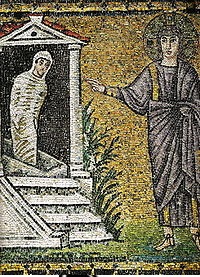
Arquivo para March 31st, 2017
Philosophy, dead and Lazarus
Do not confuse the hateful war and an immense philosophy that leads to hate,  violence and irrational war, with death that is an inevitable fact of life.
violence and irrational war, with death that is an inevitable fact of life.
From Socrates, through Plato (428-347 b.C.) to Heidegger (1889-1976) philosophy is full of theories and thoughts about death, not only frightened but also frees.
In biblical readings, in addition to the iconic Easter, for the Jews the passage to the promised land and for Christians the death and Resurrection of Jesus, this theme is also strong.
But perhaps little understood, and equally important is the dialogue about the death of Lazarus, who even before Jesus came to life, and we find in John (11,4) hearing that Lazarus was sick and died, proclaimed: “Hearing this, Jesus said, “This disease does not lead to death; It serves the glory of God, that the Son of God may be glorified by it”, glorifying with death seemed absurd.
In fact, death and the cross, a scandal for the Gentiles (those who do not believe) was the pride of Christians, who at the beginning of Christianity were sent to sacrifice and were singing.
In Socrates’ philosophy he defined it as “preparation for death,” while Schopenhauer (1788-1860), one of the first German thinkers of the 19th century to question modernity, goes so far as to say that “death is the muse of philosophy “.
The great philosopher of the ontology of our time, Heidegger states that man is mediated by his past and his Being is a “being that walks to death, but its relation to the world is often ruled by worry, anguish, knowledge and complex Of guilt.
The sense of his philosophy, however, is a leap, we can say a springboard, where, escaping from the everyday condition, we can reach our true “being,” and it is this sense that the modes and ways of enunciation become an expression of our ” I “while Being in relation to others.
Must try to “jump”, fleeing from his daily condition to reach his true “I”. The panorama of his theory is that of the sense of “being”: the ways and the ways of enunciation and expression of being.
Montaigne, said in his Essays: “Now this death which some call the most horrible of horrible things, who does not know that others call it the only port against the torments of this life? The sovereign good of nature? The sole mainstay of our freedom? And a common and immediate prescription against all evils? “At last, it is freer and more free to live well the death of what has passed and the resurrection of our Being that goes beyond.
In the Bible passage of John (Jn 13:23) in the verse ahead Jesus exclaimed: “With a loud voice,” Lazarus, come forth! “And he left, we must abandon our bandages and go to life, to The Being, and live worthily.

